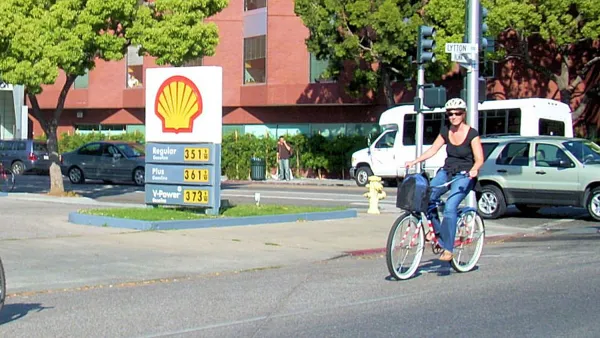Julie Pierce, city of Clayton councilmember, chair of the Contra Costa Transportation Authority, and president of the Association of Bay Area Governments, evaluates the effects of SB 375, California's key land use law to address climate change .
The opening of the editorial:
"I am a city council member, but I am also a regionalist. These are not mutually exclusive titles — each needs the other. Regional governments are built with and depend on the expertise of local officials. Because local government is the level of government closest to the people, we hear firsthand when potholes go unfilled or the garbage is not picked up.
But our residents live in regions. It’s not unusual for someone to make their home in one city but work in a second city, shop in a third and go to a fourth for recreation. Our residents expect their local governments to work together regionally.
Enter SB 375 (Steinberg, Chapter 728, Statutes of 2008), a law that requires a Regional Transportation Plan (RTP) to go beyond existing requirements and meet greenhouse gas emissions reduction targets. Implementing this policy at the regional level made sense to the Legislature because travel patterns could not be addressed on a city-by-city approach; it requires regional cooperation.
SB 375 also recognizes local authority and leverages the symbiotic relationship between local and regional planning. Local plans provide the baseline for all regional plans and investment decisions. Yet at some point, a transportation investment crosses local boundaries: A new bus line is funded, a road is built or a bike lane is created, and the land-use market responds. New homes are built, businesses spring up, and transit and freight routes are altered. Land-use investment drives transportation systems. And transportation investment drives land-use markets."
The article goes on to evaluate the effects of SB 375 according to a number of key considerations.
FULL STORY: The Future of SB 375 Implementation and Regional Planning

Analysis: Cybertruck Fatality Rate Far Exceeds That of Ford Pinto
The Tesla Cybertruck was recalled seven times last year.

National Parks Layoffs Will Cause Communities to Lose Billions
Thousands of essential park workers were laid off this week, just before the busy spring break season.

Retro-silient?: America’s First “Eco-burb,” The Woodlands Turns 50
A master-planned community north of Houston offers lessons on green infrastructure and resilient design, but falls short of its founder’s lofty affordability and walkability goals.

Test News Post 1
This is a summary

Analysis: Cybertruck Fatality Rate Far Exceeds That of Ford Pinto
The Tesla Cybertruck was recalled seven times last year.

Test News Headline 46
Test for the image on the front page.
Urban Design for Planners 1: Software Tools
This six-course series explores essential urban design concepts using open source software and equips planners with the tools they need to participate fully in the urban design process.
Planning for Universal Design
Learn the tools for implementing Universal Design in planning regulations.
EMC Planning Group, Inc.
Planetizen
Planetizen
Mpact (formerly Rail~Volution)
Great Falls Development Authority, Inc.
HUDs Office of Policy Development and Research
NYU Wagner Graduate School of Public Service



























